homepage | Takeaways From AI and the Future of Work Symposium
August 15, 2023
August 15, 2023
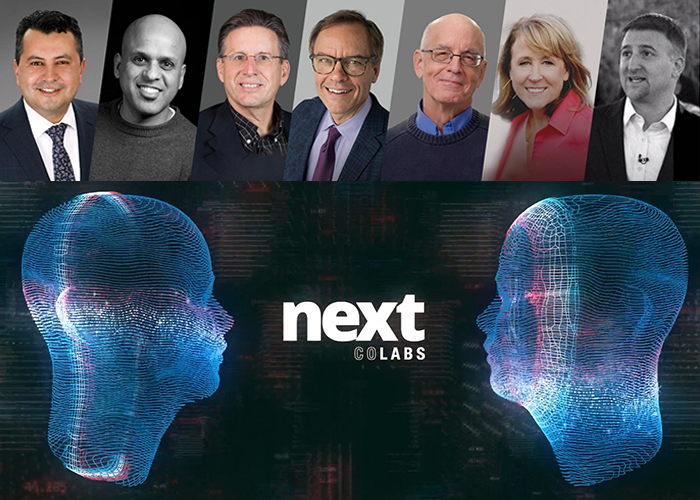
Next CoLabs’ team of AI experts and industry speakers shared perspectives on the current state-of-play of AI in business at AI & THE FUTURE OF WORK: A Symposium for Business Leaders. UMKC TalentLink highlights insights, perspectives, and key quotes from their presentations.
“Our greatest opportunity for leveraging the AI Tsunami is for each of us to develop an AI Mindset, Skillset, and Toolset,” said Gary Bolles, a global expert on the future of work and learning.

From enterprise level down to businesses of all scales, Bolles advises that companies need to develop internal policies about how AI is used ethically, legally, securely, and, equally important, proactively to benefit people.
Regarding policy development around AI, Bolles said, “Policies are either glue or oil. Friction or lubricant. Let’s focus on oil to empower people. We still have to put up guardrails, but let’s focus on how to adopt policies to help people with technology.”
One event attendee asked via chat, “What are all those employees going to do when their job has been replaced by AI?”
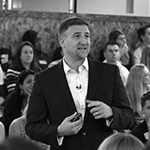
“Not replaced, enhanced,” replied digital strategy expert and speaker Roy Vella. Instead of artificial intelligence, Vella states, “we chose the wrong ‘A.’ Better to think of it as Augmented or Accelerated Intelligence. Think increase productivity, not decreased employment.”
Bolles also addressed fears that AI would lead to job losses. “AI and robots don’t make jobs go away. They simply automate tasks. It’s a human’s decision if a job goes away. It’s not a law of nature. So what we need is a commitment to continually help each human being to develop the mindset and skillset to leverage the AI toolset. We all have agency.”
One perspective meant to allay fears: Worker displacement from automation has historically been offset by new job creation. Think of the impact of desktop and laptop computers, smart phones, and the internet. Emerging new occupations following technological innovations accounts for the vast majority of long-run employment growth.
To be prepared and adapt, Bolles stresses the need for people to develop an AI mindset, skillset, and toolset. This combination will enable people and businesses to adapt to an evolving world of work where AI automates and disrupts jobs.

Doug Hohulin, a futurist and keynote speaker, serves as a Generative AI Tech Scout for Next CoLabs. Hohulin also helps organizations establish Generative AI Task Forces, focusing on AI Strategy, ROI, Ethics, Governance, Policy, Regulation, and scaling implementation beyond proof of concept.

In this regard, Hohulin said, “As AI rapidly advances, organizations, companies and governments are working to ensure its responsible and ethical development.”
He points to legislation in development in the European Union that could influence legislation, policies, and product development that complies with newly-unfolding global standards.
“Laws like the EU’s AI Act aim to provide guidance and regulation around AI. Many companies have prohibited the use of ChatGPT. At the same time, AI companies are announcing new enterprise AI products for businesses [Microsoft 365 Copilot, Google Duet AI]. This complex landscape raises important questions around how AI can be deployed and used in a way that is helpful, honest, and harmless.”
Marti Konstant, a workplace futurist, AI workshop creator, and author of Activate Your Agile Career, shared that learning to use AI is a necessary pivot for workers, especially with rapid changes in learning.

Once valuable over a 20-year span, “the half-life of education is now under four years. That is why all of us do what is necessary to stay current. No different for the newest generation in the workplace. Staying up to date on how AI affects your interests is an example,” Konstant said.
Konstant shifted her own focus from marketer to marketing technologist with a focus on AI and related technology when she “saw what was happening. That title was infinitely employable as technology advanced,” Konstant said.
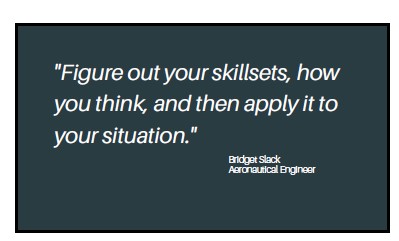
One striking pronouncement was clear, particularly for knowledge workers, if they don’t learn new skills. Konstant said, “You will not lose a job to AI; rather you will lose employment from someone who uses AI.”
Digital strategy expert Roy Vella commented on the upside of using AI. “Technology enhances humans. A hammer is an extension of your arm and strength, a phone pushes out your voice, wheels improve your legs. AI is mind-expanding, providing leverage as prior innovations have before,” Vella said.
His presentation illustrated the rapid growth potential of AI as the learning curve rises.
“An exponential curve is quite boring for most of its early existence. But as you enter the elbow, things get exciting and, it feels like it’s happening quite quickly,” Vella said. “The fundamental nature of exponential curves and the ability to process at scale explains precisely what we’re all experiencing in the last year. And it’s only just begun.”
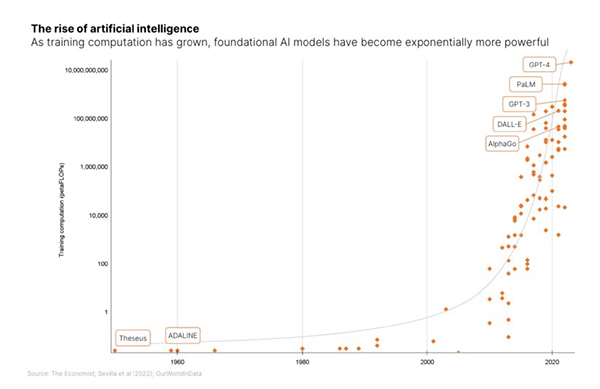
TetraNoodle Technologies founder and CIO Manuj Aggarwal’s presentation discussed the future of large language models (LLM) and the next phase of personalized AI.
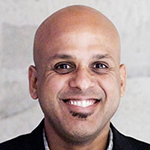
“Technology generally has no agenda. How it is adopted and used forms our agendas. The real difference in this case is that AI is the first technology which is going to surpass the human’s ability to solve problems,” Aggarwal said.
The LLMs of AI initially trained on public and private data were a starting point. Next comes Enterprise LLM, “a special kind of AI training that focuses on using secret and private information from a company to make the AI smarter and more helpful. This process is done securely, so the company’s secrets stay safe and confidential.”
“It’s like giving the AI a secret code to learn and understand the company’s unique ways of doing things, but only the AI knows it, and it won’t share it with anyone else,” Aggarwal said. With AI trained on internal data, “the AI can provide valuable insights and solutions while keeping everything private and secure for the company.”